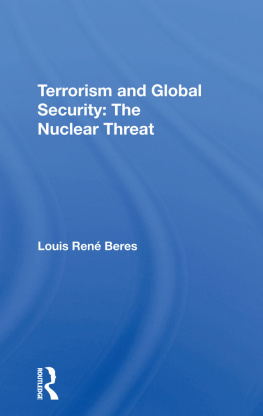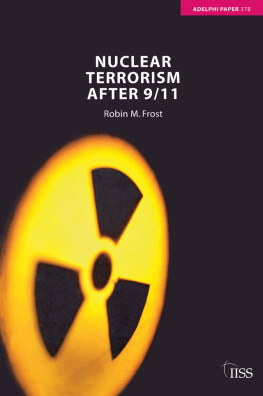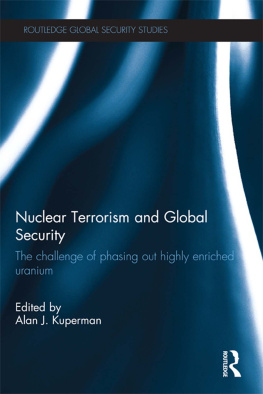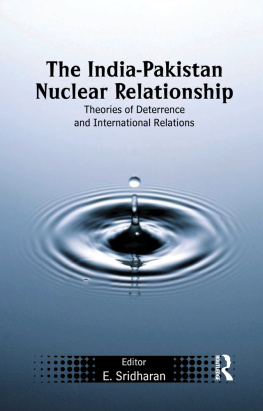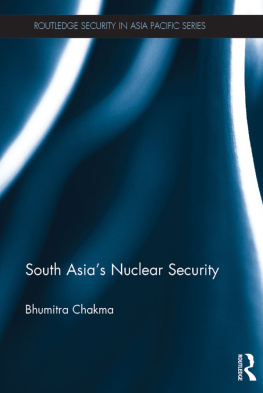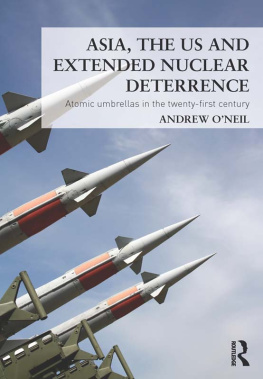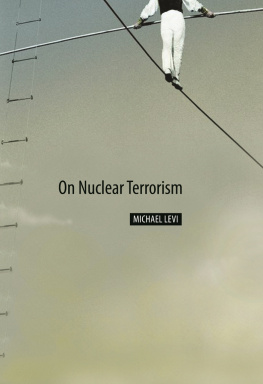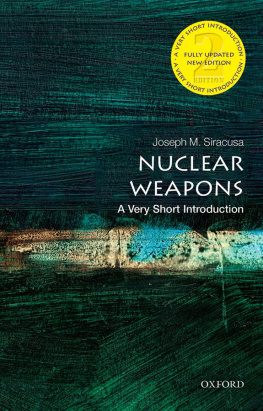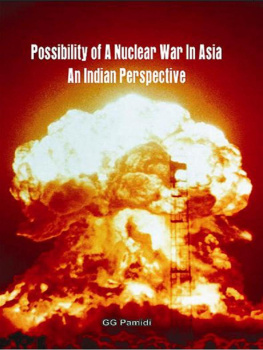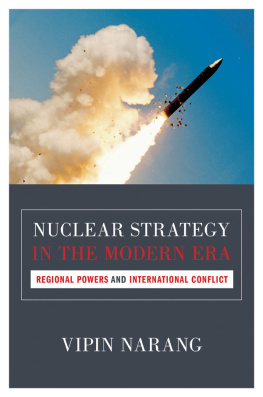Terrorism and Global Security: The Nuclear Threat
Other Titles in This Series
Terrorism: Theory and Practice, edited by Yonah Alexander, Paul Wilkinson, and David Carlton
Self-Determination: National, Regional, and Global Dimensions, edited by Yonah Alexander and Robert A. Friedlander
International Terrorism: An Annotated Bibliography and Research Guide, Augustus R. Norton and Martin H. Greenberg
Victims of Terrorism, edited by Frank M. Ochberg
Terrorism and Hostage Negotiations, Abraham H. Miller
Westview Special Studies in National and International Terrorism
Terrorism and Global Security: The Nuclear Threat
Louis Ren Beres
The enormous potential for destruction that lies latent in nuclear technology inevitably gives rise to the possibility of nuclear terrorismthe use of nuclear explosives or radioactivity by insurgent groups. Professor Beres considers the factors that might foster such terrorism, the forms it might take, and the probable consequences of each form. He then identifies a coherent strategy of counternuclear terrorism, one that embraces both technological and behavioral measures, that suggests policies for deterrence and situation management on both national and international levels, and that points toward a major refashioning of world order.
Louis Ren Beres, associate professor of political science at Purdue University, has lectured and published extensively on the subject of nuclear terrorism. His most recent books include Planning Alternative World Futures: Values, Methods, and Models and Apocalypse: Nuclear Catastrophe in World Politics.
Terrorism and Global Security: The Nuclear Threat
Louis Ren Beres
First published 1979 by Westview Press, Inc.
Published 2019 by Routledge
52 Vanderbilt Avenue, New York, NY 10017
2 Park Square, Milton Park, Abingdon, Oxon OX14 4RN
Routledge is an imprint of the Taylor & Francis Group, an informa business
Copyright 1979 Taylor & Francis
All rights reserved. No part of this book may be reprinted or reproduced or utilised in any form or by any electronic, mechanical, or other means, now known or hereafter invented, including photocopying and recording, or in any information storage or retrieval system, without permission in writing from the publishers.
Notice:
Product or corporate names may be trademarks or registered trademarks, and are used only for identification and explanation without intent to infringe.
Library of Congress Cataloging in Publication Data
Beres, Louis Ren.
Terrorism and global security.
(Westview special studies in national and international terrorism)
1. Terrorism. 2. Atomic power-International control. I. Title. II. Series.
HV6431.B47 301.6'33 79-16291
ISBN 13:978-0-367-28988-1 (hbk)
For my parents Sigmund and Margret Beres Sine qua non
Contents
- Part 1
Understanding Nuclear Terrorism - Part 2
Preventing Nuclear Terrorism
In the hazardous flux of world affairs, the specter of nuclear terrorism is particularly insidious. For the first time in humankind's history on this beleaguered planet, private individuals are capable of exploiting the destructive potential of nuclear technology. Understandably, fresh visions of oblivion and radioactive silence have kindled our apocalyptic imaginations, producing ever-greater levels of personal and collective insecurity. As if this were not frightful enough, those who might ultimately be confronted with responsibility for making crisis decisions concerning nuclear insurgency are frozen like the chorus in a Greek tragedy, distraught at the march of events that they feel powerless to control.
The situation is fraught with disquieting possibilities. But it is also too soon to despair. There are steps that can be taken, things that can and must be done, to prevent a new paradigm of violence. We need a plan, one that joins the elements of sound scholarship with the summoning and mastery of visions of atomic annihilation. With such a plan, we can begin to take the first critical steps back from a future that glows as a numbing hallucination.
The plan is complex. It cannot be limited to the sorts of "quick fix" physical security measures that are now in fashion. Rather, it must also include measures directed toward affecting the behavior of terrorists. And all strategies of counternuclear terrorism, technological and behavioral, need to be applied internationally.
Before we are able to finish our plan, we will understand its critical dependence upon a strengthened tapestry of international treaties and agreements directed at nonproliferation and superpower arms control. Moreover, because the success of counternuclear terrorism will require a major refashioning of the international legal order, we will explore the prospects for far-reaching transformations of foreign policy processes. In the final analysis, the prevention of nuclear terrorism will require states to move beyond the precarious dynamics of realpolitik to a new world politics of globalism. It would be futile to try to tinker with the portent of nuclear terrorism without such a change. Planetization, a new consciousness of unity and relatedness between states, is integral to all possibilities for enduring patterns of safety.
Let us begin our inquiry! After a conceptual examination of the terrorism phenomenon, we will consider the various factors that, in combination, might give rise to nuclear terrorism; the different forms that nuclear terrorism might take; and the probable consequences of each form. Thereafter, we will erect the scaffolding for a theory of counternuclear terrorism, a plan for deterrence and situation management that can inform promising policy efforts.
Lenin once observed, "Without a revolutionary theory, there is no revolutionary practice." The same relationship obtains between the theory of counternuclear terrorism and effective counternuclear terrorism in practice. Without the former, the latter is impossible. Recognizing this, we will construct a theory of counternuclear terrorism from which viable strategies, should they ever be needed, can be systematically derived.
I wish to thank the U.S. Arms Control and Disarmament Agency for supporting my earlier research on the subject of nuclear terrorism. Much of that research proved helpful in the preparation of this book. Of course, the views expressed in this book are those of the author, and do not necessarily represent the views of any other individual or agency of government.
L.R.B.
Part 1
Understanding Nuclear Terrorism
1
The Specter of Nuclear Terrorism: An Overview
The terrorist is a study in contradictions. He wishes the rebirth of a certain kind of order, but in the delivery a gravedigger must wield the forceps. He wishes to impress a worldwide public with the reasonableness of his claims, but chooses the tirade as his preferred means of communication. He stamps his predilections for violent excess with the imprimatur of innocence, yet it is only through the destruction of innocence that his aims can be realized.
How can we understand such contradictions? Even in the admittedly absurd theater of modern world politics, the terrorist appears more than merely avant-garde. He appears genuinely pathological. Or is it, rather, the entire global human condition that is diseased, a disintegrating nonlandscape of irrationality in which only verbalized chaos remains truly comprehensible?

